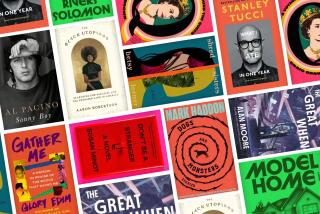Some notes from the 2013 Brooklyn Book Festival
- Share via
I never got to one of the most anticipated panels at Sunday’s eighth Brooklyn Book Festival: A conversation between legendary comics artists Art Spiegelman and Jules Feiffer. It wasn’t for lack of interest; there was just too much to do.
At the same time as Spiegelman and Feiffer were doing their thing, after all, I was moderating a conversation between novelists Meg Wolitzer (“The Interestings”), Audrey Niffenegger (“The Time Traveler’s Wife”) and James McBride (“The Good Lord Bird”), who was named last week to the National Book Award’s 2013 fiction longlist. We discussed risk, voice -- “I don’t like that word,” Wolitzer suggested, “I prefer sensibility” -- and the use of humor as a way of getting a bigger point across.
I’ve written before of my affection for this festival, but let me just say that it gets better every year. More than 200 stalls sprawled across three blocks, representing a cross-section of local independent bookstores, independent presses and magazines. At times, the crush of the crowd was so intense it was nearly impossible to move. Among the writers in attendance? Brooklyn’s own Pete Hamill, as well as Claire Messud, Eduardo Halfon, Rachel Kushner, Nicholson Baker, Francesca Lia Block and Susan Choi.
Partway through the afternoon, I found myself at a booth sponsored by the Kurt Vonnegut Memorial Library in Indianapolis, which houses, among other things, his typewriter, first editions of his novels and even rejection letters he received. It’s a quixotic endeavor but entirely in keeping with the spirit of the festival, which is, first and foremost, a reader’s event.
I hung around for a while, talking to some of the volunteers and paging through the Library’s literary journal, called (what else?) So It Goes. Issue one is currently available; a second will be published in November, around what would have been Vonnegut’s 91st birthday.
Eventually, I picked up a bookmark featuring all the “controversial words and phrases” found in the author’s 1969 novel “Slaughterhouse-Five.” I can’t tell you what these words are, but you can guess: They’re the same words zealots always zero in on when they want to argue that a book is bad for us.
Vonnegut, however, was too smart for them. In “Fates Worse Than Death,” his 1991 book of essays, he wrote of one antagonist: “The books he and his supporters wanted out of the schools, one of mine among them, were not pornographic, although he would have liked our audience to think so.”
There you have it: The power of language, of literature, and the reason an event such as the Brooklyn Book Festival continues to resonate. Vonnegut may be dead, but his legacy is reinforced any time we gather to celebrate those -- writers and readers -- who mark their passage on the planet in relation to the written word.
ALSO:
David Ulin picks his top books for fall
The National Book Awards announces 2013 fiction longlist
Charlie Kaufman to adapt Kurt Vonnegut’s ‘Slaughterhouse-Five ...
More to Read
Sign up for our Book Club newsletter
Get the latest news, events and more from the Los Angeles Times Book Club, and help us get L.A. reading and talking.
You may occasionally receive promotional content from the Los Angeles Times.








